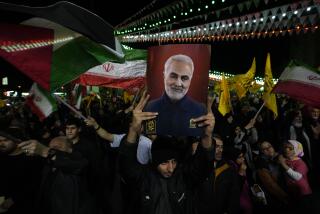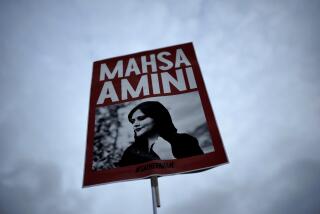Kerry, Iran’s foreign minister to meet at U.N.
UNITED NATIONS — In a sign of a potential thaw in relations, Iranian Foreign Minister Mohammad Javad Zarif will sit down Thursday with Secretary of State John F. Kerry and representatives of five other world powers in the highest-level formal meeting between U.S. and Iranian diplomats in more than three decades.
Kerry and Zarif will come together at the United Nations in a session of the so-called P5-plus-1, a diplomatic group that has sought for seven years to try to negotiate curbs on Iran’s nuclear development program. Catherine Ashton, the European Union’s foreign policy chief, announced the meeting Monday.
U.S. and Iranian officials have hinted for weeks that top officials might meet during the annual U.N. General Assembly this week to begin an intensified round of negotiations, possibly including one-on-one talks between Washington and Tehran.
A senior Obama administration official, who spoke on condition of anonymity in discussing sensitive diplomacy, said the meeting Thursday would provide “a sense of [Iran’s] seriousness … whether they’re coming with concrete new proposals, and whether this charm offensive actually has substance.”
The White House is still considering arranging a casual conversation or staged handshake between President Obama and Iran’s new president, Hassan Rouhani, although a full bilateral meeting is not planned. Aides are wary of embracing Rouhani too warmly before he demonstrates a commitment to follow through with action.
Ben Rhodes, a senior aide to Obama, told reporters aboard Air Force One on Monday that the White House would not object in principle to a meeting with Rouhani, but none had been scheduled. “We will do so if we believe it’s in our interests and if we believe it can advance our objectives,” he said.
Obama began his own whirlwind U.N. diplomacy, meeting with President Goodluck Jonathan of Nigeria to talk about security issues in Africa’s most populous nation. Obama also hosted heads of state to launch a campaign against crackdowns on civil society. He decried the terrorist attack by Somali-led terrorists at the Westgate shopping mall in Nairobi, Kenya, and pledged to “make sure that we are dismantling these networks of destruction.”
In the evening, he and First Lady Michelle Obama hosted a reception for a select group of leaders, not including the Iranian president.
On Tuesday, Obama is to meet with U.N. Secretary-General Ban Ki-moon, who is deeply involved in trying to eliminate Syria’s chemical weapons, as well as with President Michel Suleiman of Lebanon, where Syrian refugees have caused growing tension. He also will meet with Palestinian Authority President Mahmoud Abbas to discuss the possibility of renewed peace talks with Israel.
Weeks after Obama declared the United States ready to act on its own to punish the Syrian government — which Washington says killed more than 1,400 people in an Aug. 21 chemical weapons attack — he will urge the General Assembly to form a united front against future use of chemical warfare agents and to set consequences for any violations. Syria maintains that the August attack was carried out by rebels.
Aides said Obama planned to ask for a clear diplomatic process to support the U.S.-Russian agreement to put Syrian President Bashar Assad’s chemical arms stockpile under international control. Obama will argue for a U.N. Security Council resolution that carries a stiff enforcement mechanism if Syria fails to comply with the disarmament deal.
It’s a far cry from Obama’s message in August, one less focused on international unity. He said then that he would not let “paralysis” at the Security Council prevent the U.S. from unilaterally launching missile strikes against Syria, if necessary, to defend international norms against proliferation.
“The U.S. wants unity but, when we don’t get it, we’ve demonstrated we’ll go and do it on our own,” said Joseph Wippl, director of graduate studies at Boston University’s department of international relations. “Ironically, that’s what President Obama once criticized President Bush for doing.”
Western diplomats sought to lower expectations about what can be accomplished at the meeting with Iran’s top diplomat Thursday, noting that it is only one session and the problem is complex. They said Kerry and Zarif would attend only part of the meeting, and lower-level staff would take charge for the remainder.
U.S. and Iranian senior diplomats have crossed paths briefly since the 1979 Iranian Revolution but have not had substantive exchanges. Secretary of State Colin L. Powell shook hands with the Iranian foreign minister in 2001, for example.
Jen Psaki, a State Department spokeswoman, said Kerry welcomed Zarif’s agreement to meet. “We remain ready to work with Iran should the Rouhani administration choose to engage seriously,” she said.
Before leaving Tehran on Monday, Rouhani gave a taste of what he would say at the U.N. on Tuesday afternoon.
He seeks “a path for negotiations and moderation, rather than the path of sanctions,” according to Iranian news agencies. He said an agreement on Iran’s nuclear program could open the way to deals on the Syrian civil war and other regional problems.
More to Read
Start your day right
Sign up for Essential California for news, features and recommendations from the L.A. Times and beyond in your inbox six days a week.
You may occasionally receive promotional content from the Los Angeles Times.








